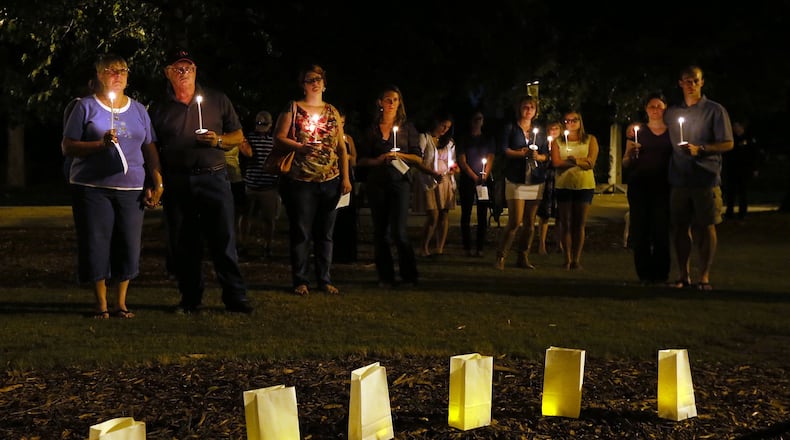Tragedy came for children in leafy Alpharetta suburbs, in Atlanta’s booming Westend, in the tumbling mountains of North Georgia, in touristy towns along the coast. No corner of the state has been spared from the devastation of youth suicide in 2021.
At least 67 Georgians under the age of 18 have died of suicide as of November 2021, an increase from 55 in 2020, according to preliminary data obtained from the GBI. Still other cases may be added to the tally, as there is generally a lag in the data. The preliminary count represents a horrible milestone: the most youth suicides reported since the GBI began tracking them over the past decade.
In 2020, a feared surge in youth suicides didn’t materialize in Georgia, with the total actually down from 60 in 2019. But first three months of 2021 saw half the deaths reported so far this year, with numbers seeming to decrease as the year has worn on.
Nationally, emergency room visits for suspected suicide attempts among children between 12 and 17 have increased dramatically during the pandemic, CDC data says. The increase in ER visits was most pronounced in girls, who historically make up a smaller share of youth suicide victims.
“Even before the pandemic, an alarming number of young people struggled with feelings of helplessness, depression and thoughts of suicide,” U.S. Surgeon General Vivek Murthy said in a Dec. 7 advisory on what he called the nation’s youth mental health crisis. “The COVID-19 pandemic further altered their experiences at home, school, and in the community, and the effect on their mental health has been devastating.”
In Cherokee County, Faith Sims sees the pain on parents’ faces on the second Wednesday of every month. Sims started a local support group for people who’ve lost someone to suicide because she couldn’t find such a meeting after losing her own 34-year-old son. It’s grown a lot, she said, and has been a resource for parents who’ve lost young children.
“We’ve seen some children as young as 11 die by suicide here in Cherokee County,” Sims said. “You can’t even process that an 11-year-old would die by suicide.”
The GBI preliminary data shows most of the 2021 deaths have been children 15 to 17, with 47 in that group. Ages 10 to 14 saw 19 deaths by suicide, and one child whose exact age wasn’t released was between 5 and 9 years old. Sixty-three percent of the youths died by a firearm.
The GBI’s Child Fatality Review Unit tracks child deaths and works the Georgia Department of Behavioral Health and Developmental Disabilities, along with myriad other partners, to prevent youth suicides through community meetings, training sessions and public service campaigns.
This year’s grim statistics come as Georgia lawmakers, various other officials and experts are drafting legislation intended to improve mental health care in the state. Georgia ranks dead last in the availability of mental health workers. The American Academy of Child and Adolescent Psychiatry recommends communities have 47 psychiatrists per 100,000 children. Georgia has only eight.
“What I hear people say when they try to get help for mental health: It’s difficult. It’s difficult monetarily. It’s difficult to find the right help,” said Sims. “Kids, they don’t even know what to ask for.”
Dr. David Purselle, an Atlanta psychiatrist who treats children at Georgia Psychiatric Consultants, said he has 800 patients and consequently had to stop taking new clients recently. “I think everybody has really filled up just because of the huge demand that’s come from the pandemic,” Purselle said.
Purselle said youths have continued to struggle because of the upheaval they’ve faced since March 2020. They missed huge chunks of in-person school, which made it harder to connect with the support system schools are supposed to provide: friends, teachers, counselors, clubs, events. In normal times, the doctor noted, school employees often spot warning signs of mental illness or thoughts of suicide, but such symptoms can be harder to see virtually.
Debbie Watson, youth program director at Athens suicide prevention nonprofit Nuci’s Space, noticed emotions running high during this year’s summer camp, higher than even in 2020. The organization offers support for musicians facing mental health struggles, including the youth summer program called “Survival Skills for the Creative Mind.”
“We had kids who would leave the room crying, or just needed some extra time alone, just to kind of process all of these feelings that have been bottled up for over a year,” said Watson.
She hopes things will get easier for kids as a new normal takes hold.
Purselle has the same hope for his patients and other children. In the meantime, he said parents, friends and others should watch for warning signs of depression, anxiety and suicidal thoughts: increased isolation, trouble sleeping, rising irritability, a drop off in performance at school.
“It’s really important,” he said.
Data specialist Jennifer Peebles contributed research.
SEEKING HELP:
Individuals with suicidal thoughts, or those who notice signs in others, can call the Georgia Crisis and Access Line at 1-800-715-4225, which is available around the clock. All calls are free and confidential.
To find a mental health service provider, visit www.mygcal.com.
About the Author
Keep Reading
The Latest
Featured




